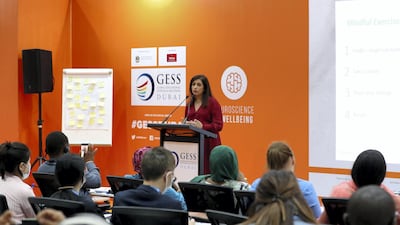Longer working hours and the increased administrative tasks are putting teachers in the UAE at higher risk of stress, a forum in Dubai heard.
For many, who move to the UAE to teach, being away from families and support systems back home can also contribute to feelings of loneliness and stress.
"They struggle to adjust to the culture, the new ways of teaching, the environment...adjusting to be here without their families, their friends, social support," Tanya Dharamshi, clinical director at Priory Wellbeing Centre in Dubai, told The National at Gess Dubai, an annual education conference.
"Often teachers are asked to work late and their mental health is often the last thing on schools’ agenda."
Frequent changes to the school curriculums means teachers are often bogged down with extra administrative work.
"They need to write reports, get data, and they are doing these things on their time, which means they are not able to recharge their batteries," said Ms Dharamshi on the final day of the conference, dedicated to wellbeing.
She said schools need to do more to support their staff including allocating safe places where teachers could engage in open dialogue without feeling judged.
"Build work-life balance, stress management, and mindfulness, into the professional development days. This is not something [teachers] should be doing on their own time.
“If teachers are exhausted they will feel frustrated," she said.
"People go into teaching because they are committed to helping, but they put their needs on the back-burner."
She said teachers end up feeling demotivated, which results in poor teaching that in turn leads to low self esteem.
This vicious cycle also contributes to a high level of turnaround in the profession.
An international survey conducted by the National Education Union in the UK last year found that four in 10 teachers plan to leave the education sector.
This year, teachers in the UAE told The National that heavy workloads were pushing them to leave private sector jobs for government schools. Teachers reported working 70 hour-weeks ahead of school inspections.
On Thursday, Ms Dharamshi presented the findings of a study conducted in December 2018 that showed more than half (56 per cent) of teaching staff worldwide felt emotionally drained by their work most of the time.
Wellbeing in International Schools, by ISC Research and Cardiff University in the UK, polled more than 1,000 teachers worldwide, including in the UAE. Around 43 per cent of the respondents said their school was not concerned about their wellbeing while 42 per cent reported feeling frustrated in their jobs.
More than one in five teachers said they felt pressured with unfinished work tasks, and three in 10 would not recommend working at their school to a friend.
But some schools are introducing measures to improve conditions for their teaching staff.
Rosemin Guerrero, a secondary school psychology teacher at Jumeriah English Speaking School, said the communication was key to break down stigma of speaking out about mental health issues.
"Teaching as profession is stressful but it’s about coping with stress, she said.
The school, in Arabian Ranches, has counsellors for teachers to speak with.
“The more we open up channels of communication, the more we break the stigma."
Monisha Gurkar, holistic therapist and life coach in Dubai, said schools would benefit from helping teachers learn emotional intelligence and gain perspective, so they may feel motivated.
Ms Gurkar coaches many teachers in the UAE.
"Teachers are so exhausted by the end of the day as they have given up everything else for the sake of their job," she said.


